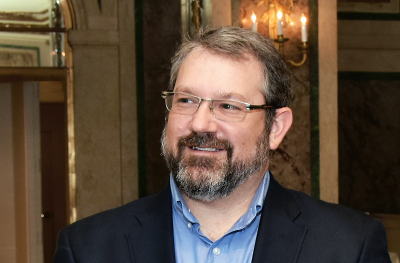Meet New Director of NIMH at Annual Meeting Town Hall
Abstract
The role of APA and its members in advocating for NIMH research funding is crucial, given limited resources and competing interests, says Gordon.
When Joshua Gordon, M.D., Ph.D., first assumed his role as director of the National Institute of Mental Health (NIMH) last year, he told Psychiatric News that his first priority would be to listen and learn—including learning how the federal agency and APA can pursue a common mission.

NIMH Director Joshua Gordon, M.D., Ph.D., says he hopes the session at the Annual Meeting will be a true conversation that includes feedback about research funding priorities.
“I intend to spend the first six months to a year learning everything that is happening at the institute and how the research community and psychiatry can work together,” he said at the time. “I hope that APA members will be patient with me and that we can work together to further the priorities that APA shares with the institute and improve the treatment of people with mental illness.”
Now it’s time for APA members to get to know the NIMH director in a town hall meeting at this year’s Annual Meeting. The session, titled “The NIMH: Programs, Priorities, and Plans,” will take place on Tuesday, May 23, from 8 a.m. to 9:30 a.m. in the San Diego Convention Center.
“Listening and learning are still my priorities,” Gordon said in an interview. “I really do want this to be a town hall where APA members and I can have a back-and-forth conversation, rather than a lecture or simply a statement of my vision.”
In the months since assuming the directorship, Gordon said that he has gained important knowledge. “I’ve learned most importantly that there is a lot more wonderful research out there than we can currently support given our limited resources. My first priority is funding high-quality research and good science and determining what is the best way to spread our resources around to support quality research.”
Gordon emphasized that APA and its members play a major role in advocating for NMH research funding. “It is really important that we make sure Congress and the new administration remember the importance of funding mental health research, given the tremendous burden of disability attributable to mental illness,” he said.
As director of NIMH, Gordon leads an organization that has an annual budget of $1.5 billion and supports more than 2,000 research grants and contracts at universities and other institutions across the country and overseas. He has an extensive research background that focuses on the analysis of neural activity in mouse models that have genetic mutations of relevance to psychiatric illnesses such as schizophrenia, anxiety disorders, and depression. His research involves an integrative neuroscience perspective and is performed across multiple levels of analysis, with the aim of understanding how a given disease mutation leads to a particular behavior.
Gordon is the recipient of numerous awards, including the Brain and Behavior Research Foundation–NARSAD Young Investigator Award, Rising Star Award from the International Mental Health Research Organization, and the A.E. Bennett Research Award from the Society of Biological Psychiatry.
Following his appointment, APA President Maria A. Oquendo, M.D., Ph.D., told Psychiatric News that she looked forward to collaboration between APA and NIMH. “Having worked closely with him over the years, I can attest to the fact that in addition to being a scientist of the highest caliber, he has an open-mindedness, fairness, and thoughtfulness that are rare indeed,” she said. ■



